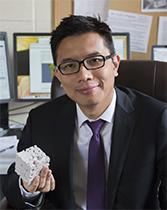Seminars
Prof. Steve WaiChing Sun
Department of Civil Engineering and Engineering Mechanics
Columbia University
Data-Driven Embedding for Computational Mechanics: From Model-Based to Model-Free Predictions and Back

ABSTRACT: We present an adaptive hybridized model-based/model-free strategy that ensures the feasibility of multi-physics simulations when different amounts of data are available. We extend the data-driven approach in the data-rich regime where the hydraulic and solid constitutive laws may switch from model-free to model-based, depending on data availability. Techniques related to identifying the constitutive manifold as hypersurfaces, the influence of the normed space, and the distance-minimized algorithm accelerated by the K-dimensional tree search will be discussed. When experimental data are less abundant, we build interpretable macroscopic surrogate elasto-plastic models inferred from sub-scale direct numerical simulations (DNS) or experiments with limited data. To overcome the black-box interpretability issue of neural network forecast, we introduce a two-step machine-learning approach that returns mathematical models interpretable by human experts. In particular, we introduce a surrogate model expressing yield surfaces and energy functionals in feature space spanned by a set of single-variable feature mappings obtained from supervised learning. A post-processing step is then used to re-interpret the set of single-variable neural network mapping functions into mathematical form through symbolic regression. This divide-and-conquer approach enables us to overcome the curse of the high dimensionality of the learning problems while yielding interpretable models ready for production code with improved speed. To test the versatility of the neural network meta-modeling framework, we conduct multiple numerical experiments where neural networks are trained and validated against (1) data generated from known benchmark models, (2) data obtained from physical experiments, and (3) data inferred from homogenizing sub-scale direct numerical simulations of microstructures.
BIOGRAPHY: Dr. Sun is an associate professor in the Department of Civil Engineering and Engineering Mechanics at Columbia University. He obtained his Ph.D. from Northwestern University in 2011 and worked as a senior member of technical staff at Sandia National Laboratories from 2011-2013. His research focuses on theoretical, computational, and data-driven mechanics for multiphase materials with complex microstructures. He has published over 80 journal articles on computational mechanics. He has received several awards for his work on computational and data-driven mechanics, including the International Association for Computational Mechanics (IACM) John Argyris Award, the American Society of Civil Engineers (ASCE) Engineering Mechanics Institute (EMI) da Vinci Award, and the ASCE Walter Huber Award.